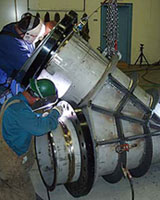Pipe Fabrication Jobs
With the steady growth in industrial, refinery and power industries in the United States, there is a huge array of pipe fabrication jobs for qualified applicants. Pipe fabrication is needed for plumbing, fire protection, irrigation and other purposes. Fabricated tubes also play a role in structural supports. These pipes are created per the customer's shape and size specifications. Fabricated pipes are known for their high tensile strength and hard core safety.
The Demand and Uses for Pipe Fabrication Jobs
Industrial settings offer many pipe fabrication job for a widening customer base. Pipes formed by fabricators can be used to heat, cool and transport liquids. And because fabricated pipes do not require couplings, they are very durable and cost effective. In addition to making pipes, there are pipe fabrication jobs that call for repairing existing pipework and installing tube joints to fix leaks and waste seepage.
Those who are interested in pipe fabrication jobs must be specially trained in this area of fabricating in order to meet the specific needs of customers. While pipe creation is the most common role of this type of fabricator, there are also opportunities for people to make pipe hangers, supports, skids and other structures. Some fabrication companies offer customized services like tank installation and fabrication as well as pump installation, maintenance and relocation.
Big industries in the U.S. have a need for pipe fabrication. These alloy and carbon steel tubing systems may include metered fittings, cement linings and jacket piping. Most designs consist of a core pipe with a jacket pipe surrounding, which lets liquid cool, heat and flow. These pipes are made in many different straight lengths and valve configurations combined with various flanges. When a high temperature must be maintained, industrial and commercial construction companies will order this type of piping from fabrication companies.
As stated earlier, there is a great demand for pipe fabrication jobs. Fabricated pipes are cut and welded according to the customer's specifications, which means there are opportunities at small and large companies. With the increasing amount of operations in mills and other industrial settings, pipe fabrication jobs and opportunities will continue to see growth over the next decade.
Special Skills Used in Pipe Fabrication Jobs
The process of fabricating quality pipes is an integral part of many different industries. In order to correctly perform project duties, pipe fabricators will need to possess general skills that include forging, machining, melting and welding. Each one of these tasks holds equal importance in the fabrication and manufacturing processes.
Besides the basic fabrication skills listed above, pipe fabricators will be expected to prepare isometric drawings and fabrication drawings. In addition, a fabrication company must supply all needed materials for any given projects. All necessary pipe fabrication tasks, such as cutting, marking, rolling and welding, have to be completed according to industry standards and codes. All pipe fabricators need to possess certification in order to operate welding machinery and perform non-destructive tests like hydro testing. Weld joints must undergo pickling and passivisation. The lead fabricator will be asked to provide QA/QC documentation.

